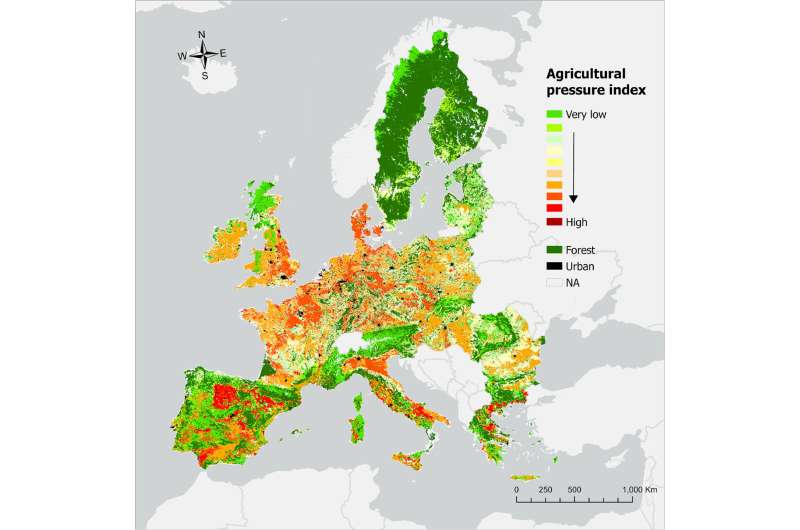This article has been reviewed according to Science X's editorial process and policies. Editors have highlighted the following attributes while ensuring the content's credibility:
fact-checked
peer-reviewed publication
trusted source
proofread
Europe-wide study investigates how agriculture affects rivers

Agriculture secures our food supply and is an important economic factor. However, it also leaves its mark on the environment, such as in soils, groundwater, and biodiversity. An international research team led by the University of Duisburg-Essen has investigated how different types and intensities of agriculture affect the ecological status of rivers in Europe. The study has just been published in the journal Water Research.
The figures are alarming: Not even 10% of rivers in Germany are in a good, near-natural state; in Europe, it is around 40%. As the largest land use categories, agriculture is considered partly responsible for this situation. Is that justified?
To answer this question, the research team, led by UDE scientist Christian Schürings, analyzed data on agricultural land use for 27 European countries. This was linked to data on the ecological status of flowing waters, including streams, but also large rivers such as the Ruhr, Rhine, and Scheldt.
The result: The type of agriculture strongly influences the condition of rivers. "Intensive farming has the greatest impact," says Schürings. The expert in aquatic ecology is the lead author of the study. "This includes irrigated agriculture, as practiced in Southern Europe, for example in Spain, Portugal and Italy, and the intensive use of pesticides and fertilizers on land in Western Europe. This is particularly common in France, the Netherlands, Belgium, Germany and the U.K."
As a result from intensive farming, nitrate, crop protection products, and other substances can end up in water bodies, floodplains are converted into farmland, and rivers are straightened, or used for irrigation in Southern Europe. This threatens or destroys important habitats for plants and animals.
The situation is different with less intensive types of agriculture. According to the study, they have little to no negative impact on the ecological status. This is because the cultivated areas are small-scale, fertilizers and crop protection products are used more sparingly, and hedges and flower strips are planted for increased biodiversity.
"Our results underline that the transition to more sustainable forms of agriculture, such as organic farming, is beneficial for rivers," says Schürings.
Co-author Dr. Sebastian Birk emphasizes that "water protection and agriculture can go hand in hand. The EU should support this through a restructuring of agricultural subsidies, so that the environmental services provided by agriculture are more strongly rewarded."
More information: Christian Schürings et al, River ecological status is shaped by agricultural land use intensity across Europe, Water Research (2024). DOI: 10.1016/j.watres.2024.121136
Journal information: Water Research
Provided by University of Duisburg-Essen




















